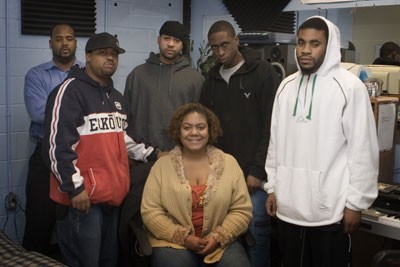Page 3 of 4
Many factors contribute to the realities and perceptions surrounding segregation in Charlotte nightlife, and theories abound.
One thing that contributes to the perception of racism, says King, is that there are many promoters out there who want to host parties at local clubs, but their party concepts aren't necessarily money-makers so club owners turn them down. "So what happens is, people can't figure out why they keep getting rejected and denied. So obviously, there must be racism," King says. "That's where it all starts."
Of course, music formats play a huge role in determining demographics. Ri-Ra, for example, books live rock acts sometimes; other times, traditional Irish fare plays over the restaurant/bar's speakers. Neither, one hostess says, attracts many black customers. But that's a far cry from intentionally excluding people of color -- all people are welcome, she says.

- Angus Lamond
- Promoter Angie Drakeford and her band the Queen City All-Stars.
Drakeford cites another factor contributing to division: The ubiquity of the so-called "black night." Several clubs are predominantly white three or four nights each week until the night when hip-hop becomes the format du jour. Crowds between the separate nights aren't likely to overlap. "Someone that comes [to a club] on a [predominantly white] college night, you're not going to find that person there on a Power 98 night," says Drakeford. "It's just not going to happen."
Menage general manager King, whose club plays mostly hip-hop and house music, disagrees, saying format doesn't segregate clubs as much anymore. "What drives a club's business uptown is college kids," King says. "Young college kids. Guess what young college kids listen to? Nothing but hip-hop. If I open up a club in Charlotte and I play rock music, I'm dead. If I play white music, I'm dead. It's all about hip-hop. So it would be ridiculous to say that somebody wouldn't play a certain type of music or not want black clientele, you know, for a reason like that." But rock, of course, is hardly dead uptown: Witness Dixie's Tavern or Buckhead Saloon, among others.
Too, there's an unwillingness among many people to step outside their comfort zones, Drakeford suggests. "People in Charlotte are still uncomfortable when they are in the minority -- that's black people, that's white people," she says. "People still harbor stereotypes about a crowd when they see it." Like Gropper, she believes some people will leave a club if they aren't in the majority. "Sometimes that can be based on race."
Michael Smith, president of Charlotte Center City Partners, a publicly funded organization that promotes economic development uptown, says the complaints are something the organization tries to address. "Any time that someone feels something, it's real. You never discount it," he says. "If people are feeling it, perceiving it, then there's something there that is worth understanding. Do I think there is systematic discrimination against any race? No, I don't think there is."
Clubs uptown have "a heavy responsibility," he says. "They have a business that's built on exclusivity. They're trying to remain exclusive. They're able to choose which customers they allow in and which ones they won't. What they're not allowed to do is choose that based on race."
Smith says his organization has followed the complaints closely. "I've talked with the owner of The Forum and the owner of Menage to help them understand that this is an issue that's important to us. They've affirmed that it's important to them."
This month, uptown business owners' commitment to diversity will be put to the test. With the Central Intercollegiate Athletic Association basketball tournament coming to Charlotte Feb. 27, bringing with it more than 110,000 fans (and their wallets) from historically black colleges, uptown's image is as important as ever. Bars uptown expect to be packed, Gropper said, and the tournament is expected to inject more than $12 million into the local economy before it ends March 4.
Will visitors be able to find places to party? Historically, Gropper says, black professionals haven't had many options in Charlotte. But King says the presence of thirty-something black professionals at Menage has increased since the now-notorious afterparty was canceled in November. "They all give me the same feedback. They say, 'We think it's great there's no thugs in here, and there's somewhere for us to go," King says. "'Because black professionals, married, mid-30s, we don't have any options in Charlotte.'"
Who's really responsible for the divide? "I do think that the clubs are racially segregated," Drakeford says. "But I blame that more on the people that are here than the club owners. If I'm a club owner, and I put a specific DJ on and I market that event, then I really don't control who comes in.
"If you go to the club, it really should be about the atmosphere and the music. It shouldn't be racially divided," Drakeford says. "I really don't think that a lot of the club owners have intended it that way. We're just a Southern city and things are starting to turn around."